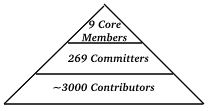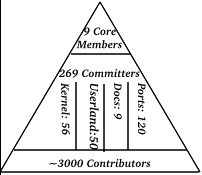Chapter 3 Organisational structure
While no-one takes ownership of FreeBSD, the FreeBSD organisation is divided into core, committers and contributors and is part of the FreeBSD community that lives around it.
Number of committers has been determined by going through CVS logs from January 1st, 2004 to December 31st, 2004 and contributors by going through the list of contributions and problem reports.
The main resource in the FreeBSD community is its developers: the committers and contributors. It is with their contributions that the project can move forward. Regular developers are referred to as contributors. As by January 1st, 2003, there are an estimated 5500 contributors on the project.
Committers are developers with the privilege of being able to commit changes. These are usually the most active developers who are willing to spend their time not only integrating their own code but integrating code submitted by the developers who do not have this privilege. They are also the developers who elect the core team, and they have access to closed discussions.
The project can be grouped into four distinct separate parts, and most developers will focus their involvement in one part of FreeBSD. The four parts are kernel development, userland development, ports and documentation. When referring to the base system, both kernel and userland is meant.
This split changes our triangle to look like this:
Number of committers per area has been determined by going through CVS logs from January 1st, 2004 to December 31st, 2004. Note that many committers work in multiple areas, making the total number higher than the real number of committers. The total number of committers at that time was 269.
Committers fall into three groups: committers who are only concerned with one area of the project (for instance file systems), committers who are involved only with one sub-project and committers who commit to different parts of the code, including sub-projects. Because some committers work on different parts, the total number in the committers section of the triangle is higher than in the above triangle.
The kernel is the main building block of FreeBSD. While the userland applications are protected against faults in other userland applications, the entire system is vulnerable to errors in the kernel. This, combined with the vast amount of dependencies in the kernel and that it is not easy to see all the consequences of a kernel change, demands developers with a relative full understanding of the kernel. Multiple development efforts in the kernel also requires a closer coordination than userland applications do.
The core utilities, known as userland, provide the interface that identifies FreeBSD, both user interface, shared libraries and external interfaces to connecting clients. Currently, 162 people are involved in userland development and maintenance, many being maintainers for their own part of the code. Maintainership will be discussed in the Maintainership section.
Documentation is handled by The FreeBSD Documentation Project and includes all documents surrounding the FreeBSD project, including the web pages. There were during 2004 101 people making commits to the FreeBSD Documentation Project.
Ports is the collection of meta-data that is needed to make software packages build correctly on FreeBSD. An example of a port is the port for the web-browser Mozilla. It contains information about where to fetch the source, what patches to apply and how, and how the package should be installed on the system. This allows automated tools to fetch, build and install the package. As of this writing, there are more than 12600 ports available. [1] , ranging from web servers to games, programming languages and most of the application types that are in use on modern computers. Ports will be discussed further in the section The Ports Subproject.

